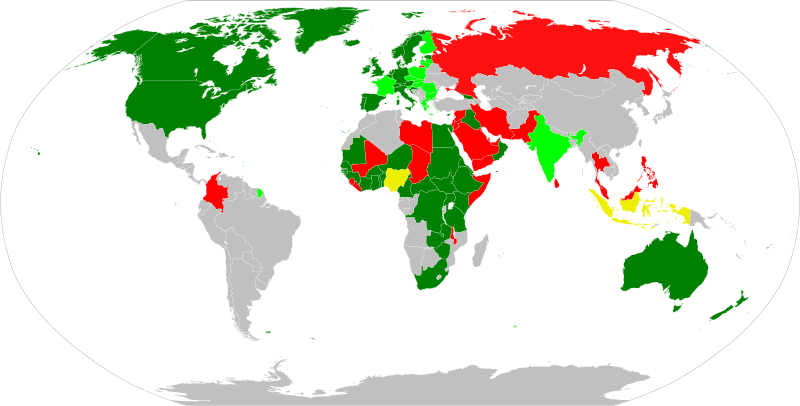File:Female genital mutilation laws by country map.svg

Original file (SVG file, nominally 2,754 × 1,398 pixels, file size: 1.2 MB)
This is a file from Wikimedia Commons. Information from its description page there is shown below.
Commons is a freely licensed media file repository. You can help, but they'd probably rather you didn't. |
Summary

|
This file may be updated to reflect new information. If you wish to use a specific version of the file without new updates being mirrored, please upload the required version as a separate file. |
| DescriptionFemale genital mutilation laws by country map.svg |
English: World map of national legislation on female genital mutilation (FGM).
|
| Date | |
| Source |
Own work, map derived from File:BlankMap-World.svg. Unless otherwise stated below, all data are retrieved from Female genital mutilation/cutting: a call for a global response. End FGM European Network, U.S. End FGM/C Network and Equality Now (March 2020). Retrieved on 5 May 2020.
The 2013 EIGE report claims that all 28 EU Member States (including Croatia and the UK) had at least general criminal law provisions that could potentially be used to prosecute cases of FGM, and in France they have successfully been, which the 2020 Global Response report acknowledges, although the latter's authors maintain that it is imperative for all states to adopt specific criminal law provisions on FGM. The 2013 EIGE report notes that there is a trend amongst EU Member States to do just that, and that by 2013, 10 out of 28 EU Member States (including Croatia and the UK amongst these 10) had specifically criminalised FGM. The 2020 Global Response report shows that EU Member States Estonia, Germany, Malta and Portugal also introduced explicit provisions criminalising FGM in the seven years between the reports.
However, the report is incorrect about the Netherlands, which first explicitly criminalised FGM on 1 February 2006, and as of 25 July 2020 specifically criminalises FGM including cross-border FGM in Articles 7.d and 71.3 combined with Articles 300–303 (additional penalties in Article 304).
Iceland criminalised FGM in 2005 under General Penal Code Article 218 a. Punishment by up to 6 years imprisonment, up to 16 years in aggrevated cases.
Indian Minister for Women and Child Development Maneka Gandhi said in 2017 that the 1860 Indian Penal Code, the 1973 Criminal Procedure Code and the 2012 Protection of Children from Sexual Offences Act (POCSO Act) can be invoked to prosecute FGM cases and that a specific law to criminalise FGM was not necessary.
The Indonesian government has been conducting an inconsistent policy on FGM, intermittently legislating against it due to international and human rights activist pressure on the one hand, and in favour of it due to internal pressure from Islamic religious authority figures on the other. FGM was criminalised in 2006, then legalised and medicalised in 2010, then recriminalised in 2014 but without punishments. The present legal status of FGM in Indonesia is unclear.
Sudan criminalised FGM in April 2020 by amending its Criminal Code. Punishable by a fine and 3 years imprisonment.
On 5 January 2021, President Trump of the United States signed the STOP FGM Act of 2020, which considers FGM 'a form of child abuse, gender discrimination, and violence', empowering federal authorities to prosecute people who 'carry out or conspire to carry out FGM' and increasing the maximum prison sentence from 5 to 10 years. This replaced the 1996 law that was declared unconstitutional in 2018. At the time of signing, 11 out of the 50 U.S. states still had no state ban on FGM.
|
| Author | Nederlandse Leeuw |
| Other versions | United States map: File:Female genital mutilation laws by U.S. state map.svg |
Licensing
- You are free:
- to share – to copy, distribute and transmit the work
- to remix – to adapt the work
- Under the following conditions:
- attribution – You must give appropriate credit, provide a link to the license, and indicate if changes were made. You may do so in any reasonable manner, but not in any way that suggests the licensor endorses you or your use.
- share alike – If you remix, transform, or build upon the material, you must distribute your contributions under the same or compatible license as the original.
Captions
Items portrayed in this file
depicts
some value
5 May 2020
image/svg+xml
File history
Click on a date/time to view the file as it appeared at that time.
| Date/Time | Thumbnail | Dimensions | User | Comment | |
|---|---|---|---|---|---|
| current | 16:04, 20 February 2021 |  | 2,754 × 1,398 (1.2 MB) | wikimediacommons>Nederlandse Leeuw | Netherlands darkgreen per Articles 7.d and 71.3 combined with Articles 300–303 of the Dutch Criminal Code. |
File usage
The following page uses this file:
Metadata
This file contains additional information, probably added from the digital camera or scanner used to create or digitize it.
If the file has been modified from its original state, some details may not fully reflect the modified file.
| Short title | World Map |
|---|---|
| Width | 2754 |
| Height | 1398 |